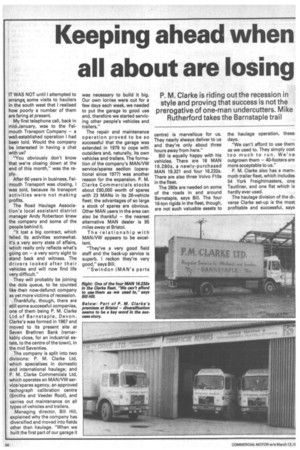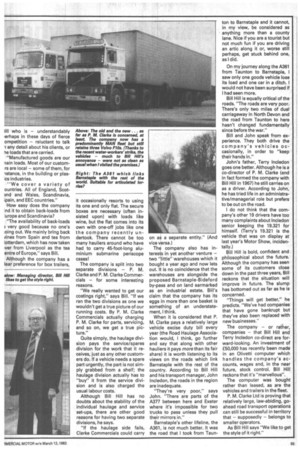Keeping ahead when all about are losing
Page 56

Page 57

If you've noticed an error in this article please click here to report it so we can fix it.
IT WAS NOT until I attempted to arrange, some visits to hauliers in the south west that I realised how poorly a number of them are faring at present.
My first telephone call, back in mid-January, was to the Falmouth Transport Company a well-established operation I had been told. Would the company be interested in having a chat with us?
"You obviously don't know that we're closing down at the end of this month," was the re ply.
After 60 years in business, Falmouth Transport was closing, I was told, because its transport activities were not making profits.
The Road Haulage Association's local assistant district manager Andy Robertson knew the company and some of the people behind it.
"It lost a big contract, which felled its activities somewhat. It's a very sorry state of affairs, wbich really only reflects what's going on a very sorry sight to stand back and witness. The drivers looked after their vehicles and will now find life very difficult."
They will probably be joining the dole queue, to be counted like their now-defunct company as yet more victims of recession.
Thankfully, though, there are still some successful companies, one of them being P. M. Clarke Ltd of Barnstaple, Devon. Clarke's was formed in 1967 and moved to its present site at Seven Brethren Bank (remarkably close, for an industrial estate, to the centre of the town), in the mid Seventies.
The company is split into two divisions: P. M. Clarke Ltd, which specialises in domestic and international haulage; and P. M. Clarke Commercials Ltd, which operates an MAN/VW service/spares agency, an approved tachograph calibration centre (Smiths and Veeder Root), and carries out maintenance on all types of vehicles and trailers.
Managing director, Bill Hill, explained why the company has diversified and moved into fields other than haulage. "When we built the first part of our garage it was necessary to build it big. Our own lorries were out for a few days each week, we needed to put the garage to good use and, therefore we started servicing other people's vehicles and trailers."
The repair and maintenance operation proved to be so successful that the garage was extended in 1979 to cope with outsiders and, naturally, its own vehicles and trailers. The formation of the company's MAN/VW service/spares section (operational since 1977) was another reason for the expansion. P. M. Clarke Commercials stocks about £60,000 worth of spares with 23 MANs in its 26-vehicle fleet; the advantages of so large a stock of spares are obvious. Other MAN users in the area can also be thankful the nearest alternative MAN dealer is 95 miles away at Bristol.
The relationship with MAN/VW appears to be excellent.
"They've a very good field staff and the back-up service is superb. I reckon they're very good," says Bill.
"Swindon (MAN's parts centre) is marvellous for us. They nearly always deliver to us and they're only about three hours away from here."
Bill is equally happy with his vehicles. There are 18 MAN 16.280s, a newly-purchased MAN 19.321 and four 16.232s. There are also three Volvo F1Os in the fleet.
The 280s are needed on some of the roads in and around Barnstaple, says Bill. The four 16-ton rigids in the fleet, though, are not such valuable assets to the haulage operation, these days.
"We can't afford to use them as we used to. They simply cost too much to run. We've outgrown them 40-footers are more acceptable to us."
P. M. Clarke also has a mammoth trailer fleet, which includes 54 York Freightmasters, one Tautliner, and one flat which is hardly ever used.
The haulage division of the diverse Clarke set-up is the most profitable and successful, says fill who is — understandably erhaps in these days of fierce ompetition — reluctant to talk 'any detail about his clients, or he loads that are carried.
"Manufactured goods are our nein loads. Most of our customrs are local — some of them, for nstance, in the building or plaslcs industries.
"We cover a variety of ountries. All of England, Scotmd and Wales, Scandinavia, ;pain, and EEC countries."
How easy does the company Ind it to obtain back-loads from urope and Scandinavia?
"The availability of back-loads ; very good because no one's loing out. We mainly bring back tines from Spain and tea from lotterdam, which has now taken over from Liverpool as the tea entre of Europe," says Bill.
Although the company has a leer preference for box trailers, it occasionally resorts to using its one and only flat. The secure boxes are necessary (often insisted upon) with loads like wine, but the flat comes into its own with one-off jobs like one the company recently un dertook. There cannot be too many hauliers around who have had to carry 45-foot-long aluminium submarine periscope cases!
The company is split into two separate divisions — P. M. Clarke and P.M. Clarke Commercials — for some interesting reasons.
"We really wanted to get our costings right," says Bill. "If we ran the two divisions as one we wouldn't get a true picture of our running costs. By P. M. Clarke Commercials actually charging P. M. Clarke for parts, servicing, and so on, we get a true picture."
Quite simply, the haulage division pays the service/spares division for the work that it receives, just as any other customers do. If a vehicle needs a spare part urgently, the part is not simply grabbed from a shelf; the haulage division actually has to "buy" it from the service division and is also charged the usual labour costs.
Although Bill Hill has no doubts about the stability of the individual haulage and service set-ups, there are other good reasons for having two separate divisions, he says.
"If the haulage side fails, Clarke Commercials could carry on as a separate entity." (And vice %terse.) The company also has interests in yet another venture — two "little" warehouses which it bought a year ago and now lets out. It is no coincidence that the warehouses are alongside the proposed Barnstaple-Bideford by-pass and on land earmarked as an industrial estate. Bill's claim that the company has its eggs in more than one basket is something of an understatement, I think.
When it is considered that P. M. Clarke pays a relatively large vehicle excise duty bill every year (the Road Haulage Association would, I think, go further and say that along with other hauliers it pays more than its fair share) it is worth listening to its views on the roads which link Barnstaple with the rest of the country. According to Bill Hill and his transport manager, John Incledon, the roads in the region are inadequate.
"They're very poor," says John. "There are parts of the A377 between here and Exeter where it's impossible for two trucks to pass unless they pull their mirrors in."
Barnstaple's other lifeline, the A361, is not much better. It was the road that I took from Taun
ton to Barnstaple and it cannot, in my view, be considered as anything more than a county lane. Nice if you are a tourist but not much fun if you are driving an artic along it or, worse still perhaps, get stuck behind one, as I did.
On my journey along the A361 from Taunton to Barnstaple, I saw only one goods vehicle lose its load and one car in a ditch. I would not have been surprised if I had seen more.
Bill Hill is equally critical of the roads. "The roads are very poor. There's only two miles of dual carriageway in North Devon and the road from Taunton to here hasn't changed fundamentally since before the war."
Bill and John speak from experience. They both drive the company's vehicles occasionally, in order to "keep their hands in."
John's father, Terry Incledon goes one better. Although he is a co-director of P. M. Clarke (and in fact formed the company with Bill Hilt in 1967) he still carries on as a driver. According to John, he has tried life in an administrative/managerial role but prefers to be out on the road.
I do not think that the company's other 19 drivers have too • many complaints about Incledon senior keeping the 19.321 for himself. (Terry's 19.321 is the vehicle that was on display at last year's Motor Show, incidentally.) Bill Hill is bold, confident and philosophical about the future. Although the company has seen some of its customers close down in the past three years, Bill reckons that the situation will improve in future. The slump has bottomed out as far as he is concerned.
"Things will get better," he predicts. "We've had companies that have gone bankrupt but they've also been replaced with new businesses."
The company — or rather, companies — that Bill Hill and Terry Incledon co-direct are forward-looking. An investment of £50,000 has recently been made in an Olivetti computer which handles the company's accounts, wages and, in the near future, stock control. Bill Hill reckons that it's "marvellous".
The computer was bought rather than leased, as are the vehicles and trailers in the fleet.
P. M. Clarke Ltd is proving that relatively large, law-abiding, go ahead road transport operationt can still be successful in territory that — supposedly — belongs to smaller operators.
As Bill Hill says "We like to get the style of it right."




























































































